Us 6 months ago: "Woooohoooo! We are actually. finally. doing it! We are going backpacking Southeast Asia for six months!" *doing a little celebratory dance*.
This was the first time either of us went on such a long backpacking trip and therefore had no experience in how much money would we end up spending on what. With the help of our friends, blogs, guidebooks, travel websites and forums we were able to get a rough idea on the daily budget to expect. We knew we could spend up to 3'000 EUR per month for both of us. This money would come from our savings and the salary David is earning with the part-time time job he is doing remotely. Based on our wildest estimations, with about 100 EUR per day for two, it should be enough for our trip.
We were very lucky to have our savings and some income while traveling, albeit reduced. Next time we're going to launch on a journey like this, we would need more time to save money specifically for our travels. We'd need to come up with a strict budget and a savings goal, like Naomi and her husband at Eat Love Explore have done. These guys have managed to save 30'000$ to travel for eight months! Now that's impressive.
Once the journey began, we started feeling lost on where our money was going and whether we were managing it wisely. We also couldn't tell whether our current spending was still withing the budget we had. To avoid having to cut our trip short, we introduced a couple of simple things into our daily routine to have a better control over our spending. This is what we want to share with you today.
We hope this detailed step-by-step backpacking couple's guide to travel budget will help you manage your travel budget and make sure you make the most out of the limited resources you have. Unless you just won a million, in which case - congratulations, you lucky bastard 😉
To Help You Navigate
Setting an overall budget goal & expenditure forecast
There are a lot of useful resources both online and offline to get an idea of how much should you expect spending on your trip to a specific country. We found that guidebooks typically tend to set rather unrealistic expectations when it comes to daily budget (too low). Our go-to sources have hence been forums and blog post from fellow travelers. Luckily, there are tons of insightful resources online. One such source is GoTravelBlogs who continuously enrich their library of travel-focused blogs.
While doing our research, we have also come across a fantastic project called BudgetYourTrip. The idea here is to collect travel expenses from other travelers, aggregate and normalize the data to provide a good estimate on what you should expect spending depending on your profile (budget, mid-range or luxury). We personally found the numbers presented here pretty accurate. Since our travel style is somewhere between budget and mid-range, when we set up a budget for a country we take the mid-range suggestion and lower it by 20%.
Going through various sources is a good start to get a general idea and set your global budget. If you have a couple of must-see places, we would recommend you research the associated costs in advance to avoid any disappointments. At the end of (almost) every travel post we write you will find a detailed breakdown of our daily expenses. Additionally, we will be posting country budget overview once our journey in the country finishes. We hope you will find this useful.
Choosing the right level of control
There are major ways to go about it -
- "Go with the flow": Understand your global budget, but spend on whatever pleases you during travel (within reasonable ranges).
Advantage: little planning and thinking involved (at least in the beginning).
Disadvantage: You might run out of money before the trip is over and will not be able to afford things you would like to do. You can probably do it if you're very good with money and keeping in mind all your expenses. - "Mindful spending": Track your daily expenses and assign those to categories. Ideally you would also have daily and total budget goals set up using those categories, so that you can compare and adjust your expenses on a daily basis.
Advantage: More spread spending and control over your financing.
Disadvantage: Requires commitment to tracking your expenses. But honestly, it doesn't take more than 5 mins a day.
At the beginning we didn't track our expenses and just went with the flow (especially because so many things seemed SO cheap in comparison to back home!). After two weeks of Indonesia we realized we had no idea where our money was going and whether our travel choices were sustainable for another five months. Not being able to pay by card almost anywhere made the recollection of expenses all the more difficult. We started feeling a bit uneasy.
This is the moment when the first version of the budget spreadsheet was created. 3 months later, we are happy we did that and we continue doing that. Knowing what we spend our money on has put us back in charge of our expenses, our budget and our trip. We have set up a daily average goal and always know when we need to have a low-key day to get back on track. When we manage to "save" some money, with clear conscience we treat ourselves to a nice meal. And this is how we do it...
Tracking expenses
We use two tools to track our money:
- Google spreadsheet for daily expenses
- SettleUp app for tracking debt between us
Excel budget sheet
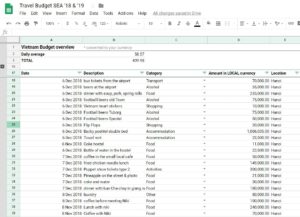
Purpose: Understand where is the money going.
Approach: On a daily basis we enter all expenses which occurred during that day. We assign them to categories and add a short description to be able to review those at a later stage. In this sheet it doesn't matter whose money was actually spent, it is about the expense itself.
The most important thing is to remember to enter your expenses daily. Luckily, google spreadsheets works on desktop and mobile as well. Worst case you can always note down your expenses elsewhere and put them into the sheet later.
Feel free to download or copy our template for your travel budget. If you do, please let us know if this worked for you. If you have any questions - please don't hesitate to leave a comment or drop us a line. We would be happy to help you!
SettleUp
Purpose: Track actual money movement and therefore debt between us.
Approach: Cash withdrawals and credit card/paypal statements are entered here. Over time, we can see who has spent how much and what amount one owes the other.
The best is to enter items here once every couple of days. This gives your bank enough time to fully process transactions (and add fees if applicable).
On a separate note, we don't have a common bank account. We have therefore been using SettleUp ever since we have started dating to track our common expenses. This means we have been tracking anything from apartment rent to grocery shopping through this app.
Why didn't we continue tracking all expenses in the app while traveling? A couple of reasons:
- We found that we end up doing a lot of small cash payments. When we both withdraw money it becomes annoying to track whose money was spent on what. So, we rather track who took out how much and track expenses separately.
- We wanted to set budget goals and see how much we spent per day and per country.
Debt settlement
Depending on your situation and agreement as a couple, there are two ways to go about it.
Option 1: You can aim to keep the balance at zero by switching turns on who pays.
Option 2: One person makes the majority of payments, the other partner settles the debt whenever agreed upon.
This is how we handle it. David works and earns active income whereas Darja has her savings and is currently investing her time in building up the blog. Not to tap into Darja's savings, we have agreed that Darja would pay back David the money once she starts earning an income again.
There is a lot of trust involved in option 2, so choose whatever works for you. The world is a crazy place, so if you want to be extra safe, you can always write a simple written agreement and both sign it. It might sound ridiculous when you are both happily in love/friendship, but it would come handy should things get ugly.
How we split our expenses
We both come from similar income profiles (as in, similar salaries before the beginning of this trip). Except for "split days", we divide everything 50/50, even if the expense was generated by only one of us. Eventually it all equals out. "Split days" is what we call days when we separate for a day and give each other space. We still track the expenses in the overall budget, but each of us pays for those separately.
The 50/50 split works for us right now. If one of us was earning a lot more than the other, we would have split it differently. For example, 80/20. Why? The underlying assumption is that you both want this travel experience to be equally comfortable for both. Just because one's job/activities are remunerated higher doesn't mean the efforts of the other one are worth less.
Analysing expenses
This is key.
There are undoubtedly benefits to simply tracking your daily expenses as just by doing so you are becoming more aware of where your money is going. However, to really be in charge of your budget, you should continuously review your actual versus planned spending and understand where do the variances come from and why. Not only will it help you stay on track with your financial goals, but it will also allow you to stay true to your priorities and travel aspirations.
Here is an example of questions we are using when reviewing our expenses:
- Is our budget (still) realistic in general / per category for this destination? If not, what needs to be adjusted?
- Are we traveling the way we wanted to? If not, what would we like to change and what impact would it have on the budget?
- If our spending is higher than planned, spending in which categories can be minimized?
- If we're overspending in one category, what do we need to change in our day to day travel life?
Our experience
Doing this kind of analysis is a very interesting exercise. On the one hand, it is very revealing where our priorities stand and what we value. For example, we know we sometimes spend considerable amounts on "tourism/activities" because we feel like once we are there, we really want to see or do something we both feel passionate about. On the other hand, it is sometimes scary how much money we spend on other categories, such as alcohol. We don't think we have a drinking problem, but it is still thought-provoking whether this is really necessary. This is also something you will hear from many other bloggers - the easiest way to keep your budget low is to reduce the drinking.
Here below we go through each category separately to give you an idea on how we travel, spend money and where we could have saved a bit more money.
Our travel budget and breakdown into categories
Every single person and couple are different and therefore travel and spend money differently. Here below is a list of categories we use in our budget and our notes on how that relates to us. This should give you a good understanding of our "travel profile" and decide, whether it is something you can relate to. We will also give you a couple of tips and tricks we have learned to save in each category.
Accommodation
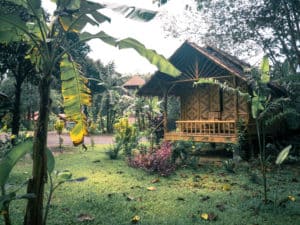
We hardly ever stay in dormitories. Not only because we like to snuggle when sleeping, but primarily because most of the time it is actually cheaper to get a private room rather than paying for two beds in a shared dormitory. We also like having some private space and our peace. Our days are mostly intense getting up early either traveling or working on some project. We therefore prefer to get a good night sleep. When we feel like being in the "hostel atmosphere" (which can be a lot of fun! :)), we book a night or two in a dormitory or simply get a couple of drinks in some hostel bar.
We typically book through booking.com, airbnb or agoda. Unless we are absolutely sure about some future dates, we tend to book our accommodation earliest the day before. Initially our rule was to keep our daily accommodation budget below 20 EUR. Now, when we do more granular country budgets, we aim to pay no more than 22% of the total daily budget for a bed for the two of us (ideally, with breakfast). The final decision is always based on the guest reviews and our perception of the place. Booking.com has a fantastic filter to sort by lowest price & best reviews - love it!
Sometimes it is easy to find something awesome for much cheaper, whereas on other days, especially in touristy places we have ended up exceeding our budget. This is why we look at running averages.
You will see in our blog post a direct link to the properties we would recommend. If you book by following the link it doesn't cost you anything but earns us a couple of cents which we highly appreciate 🙂
How to save a couple of euros:
To be completely honest with you, we feel pretty happy with our spending in this category and would therefore not want to cut the budget here. With a daily average of 14.5 EUR for two, we usually have a nice, clean but simple double room we are happy to call home for the duration of our stay. Sometimes we get super lucky and find amazing places way below what we were ready to pay. Staying at those places for a longer period helps reduce the overall average. Nevertheless, here are a couple of things we do to save a bit:
- Set up a booking.com account and book through it (at least the first night). Very quickly we got promoted to the genius status and are now getting 15% or late checkout for some accommodation.
- Speak with the property and try to negotiate a lower price than that on booking.com (if you pay directly the hotel saves on commission to booking.com, so it's a win win)
- Stay outside the city center or touristy places (duh). Most distances are really walk-able or we just get a grab (which is pretty affordable).
- Sometimes we get great super last minute deals on booking.com. This wouldn't work if you feel like you need to know where you are staying tomorrow, but we'd still recommend giving it a go.
- Lower your expectations 🙂 Sometimes a fan is completely sufficient, so you can save a couple of bucks by not booking a room with A/C. For various reasons we personally prefer a fan anyway.
Transport
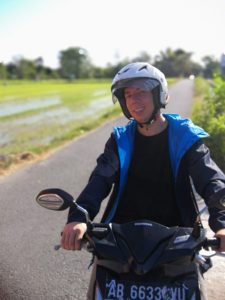
Unless ridiculously inconvenient, we try to travel with public/local transport and avoid any transfers organized by purely tourist-oriented organizations or taxis. We also tend to book our tickets directly with the provider to avoid any markups hotels, restaurants, distributors etc. add to the original price. At the same time, if given a choice between getting an uber/grab (register & get a discount) which would save a lot of time but cost 30% more than alternatives, we would probably go for it. We feel like the couple of euros saved are simply not worth the time wasted on transportation.
Currently we are spending 7.40 EUR daily for two for all types of transport, excluding international flights.
How to save a couple of euros:
We probably could have saved up to 100 EUR in 6 months if we opted for public buses versus car-sharing. As you can see, the savings would be minimal, but time spent on transfers would increase dramatically. Unless you need to watch for every penny, we would still recommend using a grab in certain situations.
A couple of times we had made the choice of more expensive transport method because we either opted for a more scenic route (e.g. ferry vs minivan in Krabi, train vs minivan in the North of Thailand) or a faster transfer (e.g. plane vs train to Yogyakarta, shuttle bus vs public bus around Taman Negara and Cameron Highlands). That being said, the price difference was hardly ever dramatic and outweighed the disadvantages of the less preferred option. Of course, not all choices made were perfect and we have learned a lot along the way.
That being said, here a couple of things we do to keep our transportation expense at reasonable levels:
- Book directly with the provider (bus/train station etc) or on 12GO Asia. Hostels and restaurants tend to put a markup on the original price.
- Look confident, like you know what you are doing. Local bus drivers sometimes chargnoe a premium for "clueless tourists". Check online what the public transport should cost and make sure you get the correct price.
- Don't take taxis, especially directly at transportation hubs like bus or train stations. Taxi drivers will jump on any backpacker coming out of the station, especially if they look a bit lost or confused 🙂 Smile politely and walk around the corner to score either a cheaper taxi or a grab.
- Get a Grab app - sometimes for two people a grab is even cheaper than two tickets on a local public transport (hint - click on the link or use the following code to get a discount while registering - GRAB074JMSFC).
- Share your rides with fellow travelers. Most of the times you will probably be heading in the same direction anyway.
- Get a scooter and do your own exploration versus booking a tour. It's much nicer anyway.
- Walk more 🙂 Not only is it healthy, but can also help you save a couple of bucks.
If you're looking for more ways to save some money on transportation, read this entertaining and no-nonsense article by Nominal Nomad about tips for finding cheap flights.
Keep in mind that having longer layovers may be a blessing in disguise as it allows you to explore new places without having to pay to go there. Read this article by Luxury Travel Hacks to learn more about Making the Most of Layover Flights.
About slow travel
There is one way you can significantly decrease your transportation expense. Transport being one of the highest spending categories in our budget, seeing and moving less would have considerably lowered the daily average. It all comes down to your priorities and aspirations. Do you want to see a country border to border or focus on a specific region?
For us personally, over time we have come to the conclusion that less is more. There are so many amazing places to see and things to do! No matter how much time you have allocated to your trip, it will never be enough if you plan on seeing every single one of them. Don't let social media, fellow travelers, friends and family back home or whoever else you listen to, force you into believing you must see everything. You will simply feel stressed trying to tick the boxes on all the must-sees without having a chance to fully emerge yourself into the local culture.
Tourism/activities
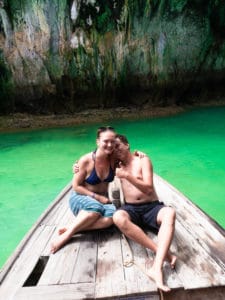
In this category we group things like excursions, guides, entrances to natural parks and temples. Most of the time we organize our travels ourselves (which is more fun and is cheaper), but occasionally there is no way around booking a tour with a travel agency. There are a couple of situations when this happens:
- self-organized tours are not allowed (very common in SEA)
- it is too dangerous/not advisable to go alone (e.g. overnight jungle trekking in Taman Negara)
- we only have limited time (e.g. in Java when we went to see Mt Bromo and Ijen)
- we want to learn more about a particular place through the help of a guide (e.g. when visiting Borobudur and Prambanan temples)
Since our journey is over a couple of months, we try to balance between "staycation" and "full-on tourist" modes. That is, there are days we dedicated fully to exploring the place we are at, but there are also days we spend working/blogging. This also keeps us sane 🙂 There would be way too many impressions to digest otherwise.
How to save a couple of euros:
There were a couple of situations where we could have potentially saved some money, had we done a bit more research beforehand. Most importantly, understanding the total
A couple of tips:
- Do your own trips when you can (rent a scooter and just explore, e.g. like we did in Bali).
- Do your research online - there are a lot of great blogs which will help you plan your trip and save some money.
- Don't trust people approaching you in tourist places offering to show you around or recommend you some tour (very often those are scams).
- If you also want to work/spend a day sorting out your pictures or just catching up with your friends, get a free day pass to one of the co-working spaces. There quite a few of them in SEA! Most of the co-working spaces offer free drinks and a decent internet connection.
- Set your priorities. You really don't need to see every single thing you have read about.
Food

We do our best to keep a balance between street food and proper sit-down restaurants. We love exploring local food, especially when it comes from an older lady on a side road. Those tend to be the best meals! Eating local most often also means eating cheaper. Occasionally we order Western food (don't judge us, we doubt at home you eat your country's local food every day either! ;)). We like eating healthy and avoid junk food with an approximate 95% success rate. Once every couple of weeks we treat ourselves to a nice meal. This typically compensates for not having dinners at home. We really miss our kitchen and hosting dinners at home with friends.
How to save a couple of euros:
- Avoid eating Western food too often. It is usually double the price of local dishes. If you can avoid McDonald's, Burger King and alike you will also save some money.
- Don't be afraid to eat street food.
- Book hotels with breakfast included.
- Share food if that's something you can imagine doing 😉
- Find a local market and buy fresh fruits, vegetables and even warm dishes sometimes. It is extremely cheap in comparison to supermarkets.
- Instant noodles can also help you get back on track with your budget. Not the healthiest option admittedly, so wouldn't recommend defaulting to this one. If you still do, make sure you combine it with some fresh veggie sides from the market 😉
- Carry some healthy snacks (like bananas or dried fruits), so you don't starve while looking for a place to eat.
Staying fit

Darja loves yoga and always looks for a yoga studio during our travels. This helps her not only to stay physically and mentally fit, but also to learn different approaches from different instructors. For her, it is definitely an important part of exploring the local culture. Recently David joined Darja on the yoga adventure, so now we are having double the fun together mastering our asanas 🙂 Can highly recommend!
How to save a couple of euros:
We actually don't want to save money on this category. Part of our travel goals remains to get healthier and happier, so we don't mind investing our money in our health. Plus, it is a lot of fun and gives us a great boost for the day!
Nevertheless, here a couple of ideas:
- Do your own workouts. Just make sure you do them.
- Book accommodation which offers free yoga/workout sessions.
- Team up with fellow travelers to do your workouts in the fresh air.
Alcohol

We enjoy a beer or a glass of wine in the evening after a full day of work or traveling. We probably enjoy it a bit too often (terrible habits) and are working on reducing the consumption. We hardly ever party and rather opt for an evening in a pub meeting fellow travelers. Truth be told, sometimes those innocent evenings in a pub grow into into "AM-adventures".
How to save a couple of euros:
Definitely by drinking less. Buying drinks in a local supermarket vs going to a bar also helps.
Cigarettes
At the beginning of our travels we both smoked. Yes, terrible. Towards the end of 2018 Darja quit and is now on an active mission to convince David to follow.
How to save a couple of euros:
Feel like this one is pretty obvious 😉 If you still insist on smoking, you can negotiate with vendors on the street.
Others
This category is reserved for random shopping we occasionally do. We don't buy much since we don't really need anything and have very limited space to carry anything.
Where we could have saved more money:
Don't shop? 🙂 And definitely - bargain. You can easily start with offering half the price of the initial quote and meet the vendor somewhere in the middle. To be brutally honest, we don't bargain as much as we could. We feel like if the price is something we are willing to pay, we just go for it.
Happy fund

Alright, this one is a bit of an extra touch 🙂
What on Earth is Happy fund?
We all have our budget and limits on how much we want to spend on certain things. When traveling you will certainly come across situations where you would really, really, really like to do that one thing, but it is just beyond your budget. If you skip it, you might end up regretting it every time you think back of it. Unless you have an unlimited budget, we're sure this has happened to you as well. What you can do is to set up an extra fund specifically dedicated to this kind of situations. That's why we call it "Happy Fund" - a fund we use to make ourselves happy 😀
So how does this work?
Before we go into details, we just want to make one thing clear. It is not that you will magically have extra money, it's more about how you manage the limited resources you have.
While you are planning your trip decide on how much you want to dedicate to these "unforeseen magical moments" you don't want to miss. We'd recommend something like 5-7% of your total travel budget. While saving money for your journey, always put a little bit aside, just for that fund.
Of course, this means that your general travel budget will decrease and you will need to count with a lower average daily expenditure. On the plus side, while you might not even notice the daily budget reduction, you now have extra savings to treat yourself to something special.
We use this fund for more expensive destinations, tours or activities we would otherwise be reluctant to pay for. Lucky as we are, we have received some contributions into our "Happy Fund" which we are extremely grateful for. Every time we spend something from this fund, we send a little note with a picture to the person who had contributed to making this happen 🙂
Talking money
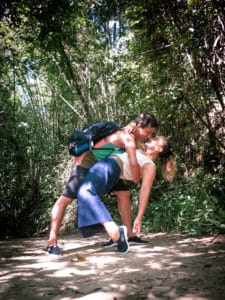
No matter how you budget your travel, if you are traveling with someone we truly believe it is crucial to discuss all money-related questions before you even start your adventure. Money is always a sensitive topic, so make sure you are both open with each other and agree on what works best for you individually and as a couple (especially if you are a couple). Sometimes to avoid awkward situations, we tend to agree to things just to cut the conversation short. Don't do that to yourself. The last thing you want is to have undisclosed frustrations getting in the way of enjoying your travel because one of you feels treated unfairly. It will also leave an unpleasant mark on your relationship.
Here are a couple of questions we went through before launching on our journey:
- How shall we split the expenses? (50/50, 80/20, 100/0 etc.)
- What goes into a common budget and what is excluded?
- When should the debt we settled (if applicable)?
- How much is either of us comfortable on spending in total for the travel?
- How much is either of us comfortable on spending on particular categories?
- Who is responsible for tracking expenses?
- What happens if one of us runs out of money (for whatever reason)?
Our expenses to date
Almost 4 months in, here is what we have managed to achieve.
- We have become more careful with how we spend money and on what
- We adjust our daily budget per country and are better at reaching it
- We guide our decisions based on the current budget standing
- We are better at planning our expenses
Here below is overview when it comes to our travels and expenses to date. We have traveled to Indonesia (1m), Malaysia (3w), Thailand (2m) and Laos (12d). Until today we have spent about 8'000 EUR between the two of us. Our daily average is 64 EUR, although this varies significantly from country to country. For example, in Laos we had spent 57 EUR daily whereas in Malaysia this number was 78.23 EUR. Of course, we have also learned a couple things along the way, so we feel like we are getting better in meeting our goals. Our biggest expense by far is food (27.5%), followed by accommodation (22.75%), alcohol (14%) and activities (13.6%). See more details here below:
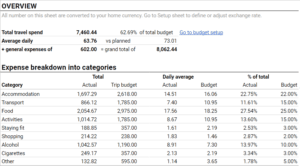
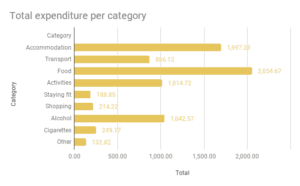
In a couple of days we are traveling to Vietnam. We aim to lower our food expenses by having cheaper food options and decrease the alcohol expense simply drinking less. Let's see about that during all the Christmas and New Year celebrations 😀 We will be happy to report on our success if you are interested.
Should you have any questions about our expenses or the spreadsheet we have prepared, please don't hesitate to get in touch! We would love to help 🙂
Are you on pinterest? Pin this post!
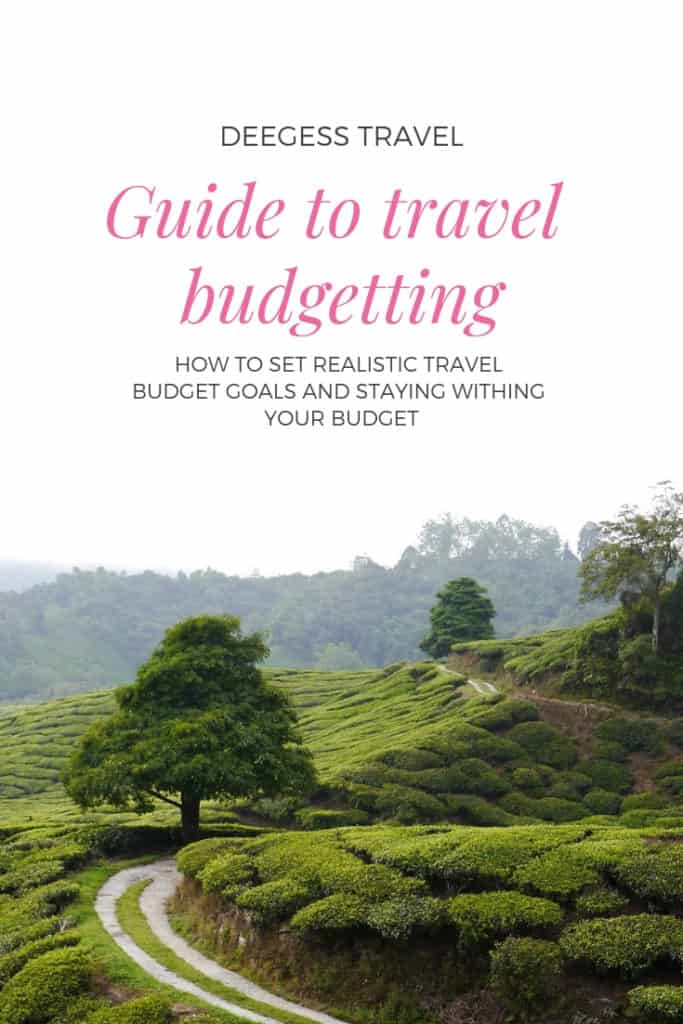
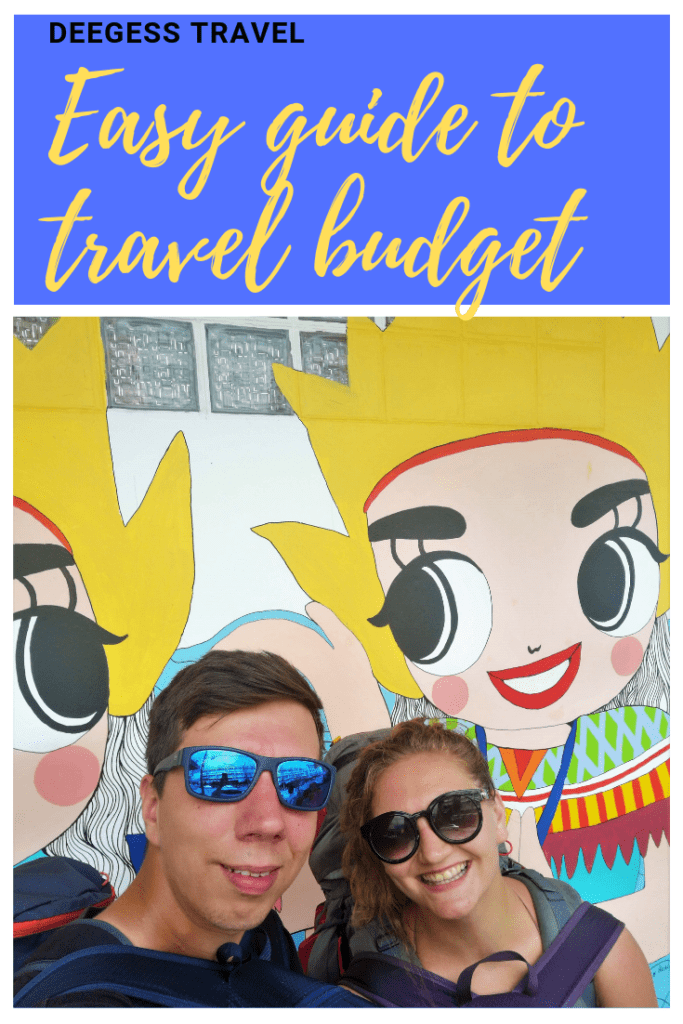

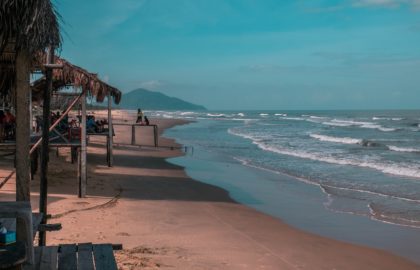
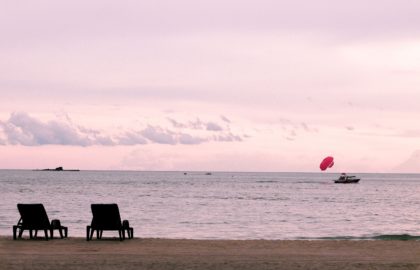


36 Comments
This is great! Saving for future plans 😉
Thanks, Macey 🙂 glad you found this useful 🙂
It’s very hard for my husband and I to say money when we travel because # 1 – I travel for FOOD, LOL – and this girl is going to EAT 😉 Also, I’m totally the type that regardless of where we are going, I need a gym in the hotel, which means, no Air BnBs or Hostels for us – ha! I sound like such a diva because I know my husband would have NO PROBLEM staying in hostels.
Haha I know what you mean 🙂 we also struggle saving money on food. In fact, almost 30% of our total daily budget goes to eating 🙈 when it comes to staying fit while traveling – you’d be surprised how many hostels/guesthouse have gym or yoga facilities these days 😉
This article is really helpful for managing money while travelling.Thank you so much for sharing it with us ❤
Thank you for your kind words, Shnooks! 😊 Sharing is caring 😉
I love the excel budgeting sheet! Thank you!! My boyfriend and I want to travel so bad, but it’s hard to afford it. These are some great tips.
Thank you, Melissa 🙂 I’m very happy to hear you found this helpful 🙂 travel is awesome & there are some great affordable options you and your boyfriend could go for while staying low budget:) hope you guys get a chance to go travel sometime soon 🙂
Gosh. Reading your article made me miss the out doors. I hope I get to travel again soon. Thanks for the inspiration.
haha, that’s fantastic! Any ideas yet on what the next destination may be? I find it so exciting to be looking forward to your next trip 🙂
Wonderful sharing! Thank you very much for this amazing article. What a good post to help save up for traveling , will try your budgeting sheet for next travel. thanks
Thanks, Nancy! I am happy to hear you found this insightful 🙂
What an amazingly detailed post! I will be sharing this with my sister she will find this so helpful
Aw, thank you, Renee! Does your sister travel a lot?
Thanks for collaborating these awesome tips & presenting them.
Thanks, Sanjota! I am glad you found them useful 🙂
I so wish I could just tag my boyfriend to this like facebook aha this is amazing, honestly. I’m definitely bookmarking it and showing it to him so we could start looking into travel once I’m better.
Haha, thanks Chantelle 🙂 I hope you get better soon and can launch on an exciting adventure with your boyfriend 🙂
Traveling in Southeast Asia is the best! Especially the Philippines (no bias)!
It absolutely is! Absolutely love this region! We haven’t been to the Philippines yet, but planning on going there in February 🙂 Can’t wait to see it 🙂
wow you are so well organized!!! i´ve done that for 2 months! totally worth it ! you will love it ! best of luck
hehe, yeah, we try our best to stay organized at least when it comes to money. The rest is mostly impromptu 😉 You are right – it is absolutely worth it, loving every single moment of it <3
I’ am solo traveler and I think this article would help for saving money! Nice one!
Happy you found this helpful 🙂
Wow! Love how detailed your article is! I think most people who travel aren’t amazing at budgeting whilst out there, so great tips!
Thanks, Emilio! Yes, that’s we thought when we were preparing this. It is a shame a lot of people travel less because they think it has to blow their budget. It doesn’t have to, if you manage your money wisely 🙂
One of the biggest reasons I don’t travel more is because of the expense. Its so good to know you can see the world and not go broke doing it! I will definitely be utilizing these tips.
Yes, Samantha! 🙂 Do that! 🙂 Travel is one of the most amazing things you can do with your time and money 🙂 Glad we could help you at least a tiny little bit in travelling more. If there is anything we can do to help you budget your next trip, don’t hesitate to get in touch.
I’m terrible at traveling light! Thanks for sharing!
It’s a learning curve 😉 You’re mostly welcome 🙂
This article really helps in saving some legwork from soliciting the help of ofriends, blogs, guidebooks, travel websites and forums we to get a rough idea on the daily budget to expect. This article provides so much great information.
Thanks, Keisha 🙂 I’m glad you found this useful and time-saving. Anything we can do to help others plan their travel budget and not go broke after the journey 😉
It’s so easy to lose track of the budget when traveling. Love this post!
It SO is! There are so many temptations 🙂 It all comes down to your priorities 🙂 Aww, glad you loved it, Ronesha.
That’s what you call travelling on budget !!! Great tips. It would greatly help me out in planning my treks !!!
Thanks, Sarbjit 🙂 We are thrilled we could help you in planning your trips! 🙂